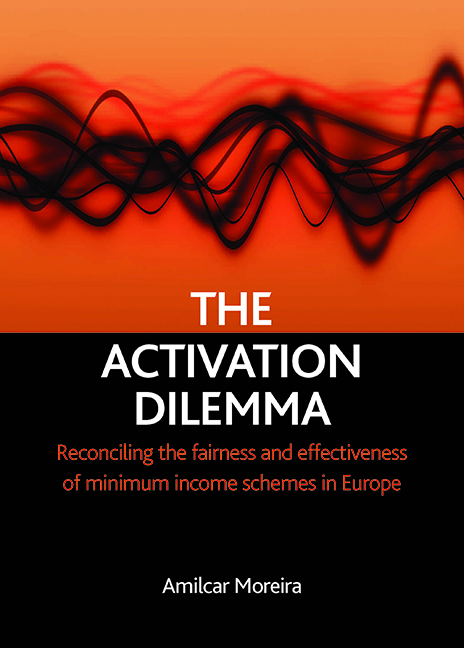 The Activation Dilemma
The Activation Dilemma Book contents
- Frontmatter
- Dedication
- Contents
- List of tables and figures
- List of abbreviations
- Acknowledgements
- one Introduction
- two The right to a minimum income: between Mead and Van Parijs
- three Justifying a minimum income guarantee: the right to personal development
- four The activation dilemma: a comparative study
- five Measuring respect for the right to personal development
- six The employment effectiveness of minimum income schemes
- seven The employment effectiveness of minimum income schemes and their respect for the right to personal development
- eight Conclusion
- Appendix A Methodology for benefit comparison
- Appendix B Unemployment reintegration capacity (URC): sensitivity analysis
- Appendix C Qualitative comparative analysis: laws of Boolean algebra
- References
- Index
- Also available from The Policy Press
- Frontmatter
- Dedication
- Contents
- List of tables and figures
- List of abbreviations
- Acknowledgements
- one Introduction
- two The right to a minimum income: between Mead and Van Parijs
- three Justifying a minimum income guarantee: the right to personal development
- four The activation dilemma: a comparative study
- five Measuring respect for the right to personal development
- six The employment effectiveness of minimum income schemes
- seven The employment effectiveness of minimum income schemes and their respect for the right to personal development
- eight Conclusion
- Appendix A Methodology for benefit comparison
- Appendix B Unemployment reintegration capacity (URC): sensitivity analysis
- Appendix C Qualitative comparative analysis: laws of Boolean algebra
- References
- Index
- Also available from The Policy Press
Summary
Minimum income schemes occupy a pivotal role in the overall architecture of social protection systems in Europe and other advanced economies. Commonly referred to as (general) social assistance (see Eardley et al, 1996a, p 28), or as safety-nets (Cox, 1998, p 397), these schemes provide the ultimate layer of income protection for those in need. They are the most evident expression of a societal commitment that all individuals are entitled to a dignified existence and that no one should experience unwanted need.
For the sake of clarity, minimum income schemes can be defined as schemes that provide a financial safety-net for individuals whose personal/household income is below the national social minimum. Because of their subsidiary nature, minimum income schemes are only available to individuals who (with some exceptions, such as family benefits) are no longer eligible for other forms of income protection. Unlike categorical social assistance, minimum income schemes are (quasi)universal, that is, they are not targeted at particular groups or social risks (Eardley et al, 1996a, p 28). Unlike social insurance, which provides insurance-based protection against (work-related) social risks, such as unemployment, old age or illness, minimum income schemes are a non-contributory form of protection (Lødemel and Schulte, 1992, pp 8-9). Currently, this serves to identify a number of schemes in Europe (see Table 1.1).
Minimum income schemes and the provision of a safety-net in Europe
There have been a number of attempts to map the differences in the provision of a minimum income in Europe. The most comprehensive of these studies was carried out by Eardley et al (1996a), which identified five different clusters in the provision of social assistance in Europe (Eardley et al, 1996a, p 165) (see Table 1.2). Despite its relevance, this study provides little information on the role of minimum income schemes in the broader framework of welfare provision. In light of this, it might be helpful to overlap it with the welfare state typology proposed by Ferrera and colleagues (2000). Looking at aspects such as risk coverage and eligibility, the structure of benefits, the financing mechanisms and the organisational arrangements in place, the authors identify four welfare state models: the Scandinavian model, the Anglo-Saxon model, the Continental model and the South European model (Ferrera et al, 2000, pp 15-19) (see Table 1.3, page 10).
- Type
- Chapter
- Information
- The Activation DilemmaReconciling the Fairness and Effectiveness of Minimum Income Schemes in Europe, pp. 1 - 16Publisher: Bristol University PressPrint publication year: 2008


